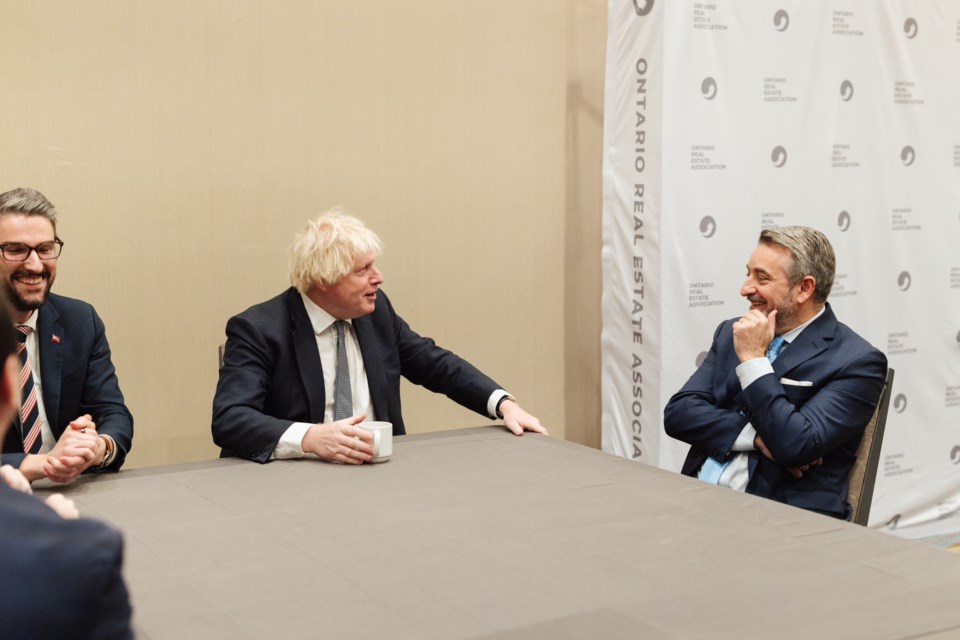Boris Johnson has taken his ski boots off.
The former U.K. prime minister was in Ontario this week, where he spoke at the Ontario Real Estate Association (OREA) Power House public affairs conference, attended a Wellington Advocacy event alongside former Canadian prime Minister Stephen Harper, and met with a few Ontario cabinet ministers.
He explained the ski boots bit in a fireside chat hosted by former Ontario Progressive Conservative leader Tim Hudak, now the head of OREA.
Johnson ruffled his hair and turned to the Realtors: Who'd been skiing, he wondered, and what do they think the best part is?
"Taking the ski boots off, right?" he replied to himself.
"A beautiful girl once told me there are two things she really enjoyed in life — and one of them was taking (off) her ski boots."
Being out of politics now, he continued, is a bit like that.
"But the thing is that, after a while, you start to wish you were skiing again — that's the terrible truth, but I don't think I've reached that point yet."
Speaking of putting one's ski boots back on, Hudak asked Johnson to weigh in on David Cameron's return to British politics.
"Look, I think it's great news for retreads everywhere," he replied.
"Across the political landscape, the nails are peeling out of the coffin lids," he continued and was drowned out by laughter. "And the sheeted dead are wandering and gibbering in the streets."
We used to complain about gerontocracies in Russia and China, he continued, "Well, look at the U.S."
The rest of the talk was similarly off-the-cuff and ranged from the ridiculous — a vendetta against bendy buses — to the sincere, with a frank admission of his country's historical role in the war in the Middle East.
Johnson gave two reasons for why he ran for mayor of London in 2008.
His party had "exhausted every available alternative" was one.
"Which is generally why they come to me under any circumstances," he added.
The second was a bendy bus.
Johnson was cycling one day when a bendy bus passed him and he tried to overtake it.
"I pedalled faster and faster and harder and harder and the bus started to swing out," he said. "It was articulated, right? You know, these things are monsters, and it started to push me out into the traffic. I knew I was going to die — and I can see all of the people reading their papers, and they're looking down apathetically, and see me about to get crushed, and they're looking back to their papers."
Johnson blamed his predecessor, Ken Livingstone of the Labour Party, for putting the bus on the streets out of a socialist desire to have people use transportation the government controls, like tubes, trams and buses — something that didn't stop him from boasting of the expansion of mass transit that took place under his watch.
And after he was elected, he really did get rid of the bendy buses.
The OREA conference was, of course, about housing.
As mayor, Johnson introduced London's housing design guide, because he didn't like the "plasticy" look of new buildings that gave the skyline the look of "a ransom note," he said.
"And so I — we — came up with this idea of the New London Vernacular," he said, describing the architectural style as "a kind of modern homage to the old Georgian style of architecture."
But the unintended result, he said, was to spur a great deal of housing construction in London.
Johnson spoke less about being prime minister than mayor and, when asked about his best moment at 10 Downing Street, there was a very long pause. He ultimately listed a few highlights, including the quick release of the AstraZeneca COVID vaccine, which he attributed to Brexit.
"COVID was pretty dominant during my time," he said.
But the talk wasn't all bendy buses and favourably revisionist history. At the end, Hudak asked the former prime minister for his views on the Israel-Hamas war.
"The only thing I would say is that it is important to maintain moral clarity, if you can, about what Hamas did on October the 7th and what Israel is now trying to do to make sure that type of terrorist attack can't happen again," he said. "There is a difference, in my view, between the terrorist attacks of Hamas militias, which were brutal — and the rape and the torture and the murders — these were indiscriminate attempts to cause massive human suffering and degradation."
But even as a staunch supporter of Israel, Johnson said, he believes what's happening now in Gaza is a tragedy and said he yearns for "a clearer idea of the future from Israel's point of view," and hopes to hear Israel articulate a future with a two-state solution.
"And as for the role of the British government, historically, 100 years ago, in helping to set up some of the problems, well, everybody knows that and no one in my position is going to try and evade responsibility," he added. "It's our job to try and address it, and the only way we can do it is with a two-state solution, and that's the best I can say."
Johnson was the keynote speaker at the OREA Power House conference, which typically brings together speeches and panels by Ontario politicians and political types. (Full disclosure: this author spoke on the media panel.) This year, Premier Doug Ford, Ministers Paul Calandra, Todd McCarthy and Lisa Thompson, and the opposition party leaders also spoke to the association at the conference.




